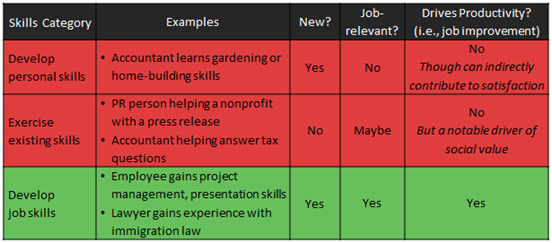Volunteerism and pro bono service activities almost always involve volunteers exercising personal and professional skills, but which activities actually develop skills with quantifiable business value?
The key is recognizing that skill development generates business value when it enables a person do his or her job better. Specifically, this means gaining skills or experiences that help to complete job-related tasks more quickly, or produce more successful results (i.e., “productivity” in business jargon).
With this in mind, consider the three most typical types of skill-related experiences in volunteerism -- only one of which directly generates business value:
- Development of personal skills. This occurs when volunteers develop new skills or experiences that are not relevant to their jobs. Consider an accountant that participates in a home- or playground-building project in a low-income community. The construction skills and community engagement experience she gains may be new and profoundly satisfying on a personal level, but neither is relevant to enhancing her productivity as an accountant.
- Exercising existing skills. This occurs when volunteers use job-relevant skills as part of their volunteerism, but do not expand those skills. Consider a corporate PR manager that uses her expertise to help a nonprofit plan and write a press release. This activity will generate significant value for the nonprofit (i.e., social value). However, if this is just one more PR activity similar to the hundreds the volunteer has already completed for her company, then it’s not expanding her skills or experiences – or her ability to do her job better.
- Development of job skills. This occurs when volunteers realize new skills or experiences that are relevant to their jobs. Consider a volunteer that gets to take a leadership role that expands his project management or presentation skills; or a lawyer that provides pro bono counsel and meanwhile gains valuable new experience in immigration law. Both examples are illustrations of “new” and “job-relevant” skill gains that can help the volunteers do their jobs better. This category generates skill-related business value.

Next Steps – Planning and Matching
The simple act of distinguishing between the three skills categories presented here, and when possible, steering your volunteers towards opportunities to gain new, job-relevant skills and experiences can pay huge dividends.
For example, among the participants in our Volunteerism ROI Tracker (2010), the percentage of companies that gained new, job-related skills from their volunteers and pro bono service ranged from a low of 3% to a high of 49% -- suggesting that well-designed and strategically matched volunteer activities achieved over 16x the skill gains of those that were not.
Next: How to measure the business value of skill development.
Interested in measuring the social impact of your company's volunteerism and pro bono services? Schedule a demo with our team for more information.
Image: CC BY 2.0



